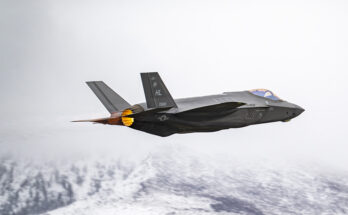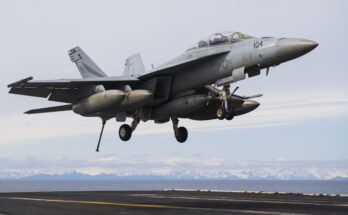Two separate fighter jet sales to Qatar are hitting scrutiny amid a crisis between Gulf countries.
The decision by four Arab countries, later joined by more, to cut ties with Qatar earlier this week may impact two separate fighter jet sales to the Gulf State.
Qatar concluded a $7 billion deal with France for 24 Dassault Rafale fighter jets last year, complete with associated equipment and missiles manufactured by MBDA. It is not believed that any deliveries have occurred yet, with transfers probably beginning in 2018. Nevertheless some aircraft, such as EQ01, have been spotted undergoing flight testing.
Pictures: Qatar Air Force Rafale EQ-01 making test flight today at Bordeaux-Mérignac airport (c) JP DEWAMhttp://t.co/yy6DAcHhXd pic.twitter.com/MYJKumpty6— Derek Bisaccio (@DerekBisaccio) March 27, 2017
Earlier this week, as the Gulf crisis was unfolding, a vice president of France’s National Front party (whose head, Marine Le Pen, was defeated in a presidential election this year by Emmanuel Macron) called on President Macron to follow Saudi Arabia and other countries in cutting ties with Qatar. Any such move would almost undoubtedly cancel or stall the Rafale deal.
President Macron himself was skeptical of Qatar during his presidential campaign, but since the onset of the Gulf crisis he stated his willingness to back “all initiatives to encourage calm” in a phone call with Qatari Emir Sheikh Tamim bin Hamad al-Thani.
Given the financial and jobs incentive in maintaining the deal, which is already being implemented, as well as the fact that President Macron’s Foreign Minister, Jean-Yves Le Drian, played a key role in getting the Rafale sale concluded, it is unlikely that President Macron will, at this stage, take any extraordinary steps against Qatar. Parliamentary elections slated for later this month may well yield the president’s party a large number of seats and allow him to ignore efforts by the National Front to push him into drastic moves with Qatar.
But, paradoxically, the Gulf dispute could well turn out as a boost for the Rafale deal, which carries an option for 12 additional Rafale fighter jets, depending on the outcome of another fighter jet sale to the Gulf country, pertaining to American jets. In November, the U.S. State Department approved a possible foreign military sale to Qatar worth $21.1 billion for the sale of Boeing F-15QA fighter jets. Doha had requested 72 F-15QAs as well as associated parts and equipment.
Despite the approval, Qatar has yet to formally sign an agreement for either all 72 jets or a smaller figure. (It has been suggested Qatar ultimately wanted 36.) Defense News reported on June 6, 2017 that the ongoing Gulf crisis — especially the American response to it — could negatively affect the F-15 sale, particularly if the crisis is prolonged rather than resolved quickly.
While American officials so far have mostly stayed out of the Gulf fray or reiterated praise of Qatar for its “enduring commitment to regional security” without otherwise taking sides, new American President Donald Trump has opted to use his Twitter feed to criticize Qatar and support the Saudi decision to cut ties in a series of three tweets (below).
During my recent trip to the Middle East I stated that there can no longer be funding of Radical Ideology. Leaders pointed to Qatar – look!— Donald J. Trump (@realDonaldTrump) June 6, 2017
So good to see the Saudi Arabia visit with the King and 50 countries already paying off. They said they would take a hard line on funding…— Donald J. Trump (@realDonaldTrump) June 6, 2017
…extremism, and all reference was pointing to Qatar. Perhaps this will be the beginning of the end to the horror of terrorism!— Donald J. Trump (@realDonaldTrump) June 6, 2017
Doha is unlikely to take kindly to the criticism — it rejects the measures taken against it as “unjustified and based on false claims and assumptions” — though so far its reaction has been primarily surprise. At present American foreign policy does not appear to be following the direction of the U.S. President’s tweets, but a shift in U.S. relations with Qatar could derail the proposed sale.
Speaking specifically about the F-15 sale and the likelihood that President Trump could derail it, Senator Claire McCaskill (D-MO) told Defense News, “I can’t imagine that the president would want to have that kind of impact on American jobs.”
Boeing, in a statement provided to Defense News by spokeswoman Caroline Hutcheson, said, “We have been working closely with the U.S. and Qatari governments on this proposed sale. We continue to expect that an agreement will be signed.”
But even if the sale does get signed, Doha could well reduce the size of its order as a response to criticism from American officials, particularly the president — especially in the event that criticism is sustained moving forward and followed up with policy moves seen as unfriendly by Doha.
As Qatar sought options for new fighter additions to its inventory several years ago, it was looking for a total of 72 fighter jets. Of these, 24 will be Rafales. The breakdown of the remaining 48 jets was generally expected to be a combination of 36 F-15s and the 12 Rafales included as options.
A spat with the U.S. could well sour Qatar’s mood on the F-15 sale, resulting in a certain decision to exercise the Rafale options and the possibility that Qatar would at least downsize its F-15 order in favor of either another order for Rafales or the Eurofighter Typhoon. Qatar had previously considered the Typhoon, which has been ordered by neighbors Kuwait and Oman (both of whom have not joined with Saudi Arabia in breaking ties with Qatar), as well as Saudi Arabia.
Arms sales are a lengthy process and, particularly between two allies, usually not at risk of being derailed by a single incident, or, in some cases even a series of negative interactions. Saudi Arabia, much to its displeasure, sustained public criticism from the former Barack Obama Administration for years, yet still sought to purchase large amounts of American weaponry; much of the systems announced in a recent arms package between the United States and Saudi Arabia were negotiated under the previous U.S. administration.
But given the nature of this latest dispute — the accusations made against Qatar and the demands being levied — Doha may be less forgiving if its ally in America piles on instead of seeking a constructive solution without giving the appearance of taking sides.
UPDATE: This post has been updated to reflect the fact that Saudi Arabia has also ordered Eurofighter Typhoons, which was not initially included in this post.
Military markets analyst, covering Eurasia, Middle East, and Africa.




